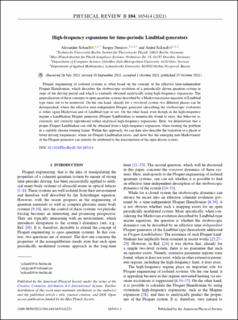High-frequency expansions for time-periodic Lindblad generators
Peer reviewed, Journal article
Published version
Permanent lenke
https://hdl.handle.net/11250/2982180Utgivelsesdato
2021-10-15Metadata
Vis full innførselSamlinger
Originalversjon
Physical review B (PRB). 2021, 104 (16), 1-22. https://doi.org/10.1103/PhysRevB.104.165414Sammendrag
Floquet engineering of isolated systems is often based on the concept of the effective time-independent Floquet Hamiltonian, which describes the stroboscopic evolution of a periodically driven quantum system in steps of the driving period and which is routinely obtained analytically using high-frequency expansions. The generalization of these concepts to open quantum systems described by a Markovian master equation of Lindblad type turns out to be nontrivial: On the one hand, already for a two-level system two different phases can be distinguished, where the effective time-independent Floquet generator (describing the stroboscopic evolution) is either again Markovian and of Lindblad type or not. On the other hand, even though in the high-frequency regime a Lindbladian Floquet generator (Floquet Lindbladian) is numerically found to exist, this behavior is, curiously, not correctly reproduced within analytical high-frequency expansions. Here, we demonstrate that a proper Floquet Lindbladian can still be obtained from a high-frequency expansion, when treating the problem in a suitably chosen rotating frame. Within this approach, we can then also describe the transition to a phase at lower driving frequencies, where no Floquet Lindbladian exists, and show that the emerging non-Markovianity of the Floquet generator can entirely be attributed to the micromotion of the open driven system.

